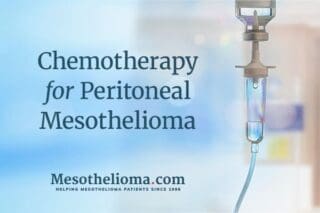
Researchers conducting a phase III mesothelioma clinical trial are hopeful the results will lead to a new standard of care. The clinical trial is testing the efficacy of introducing an adenovirus followed by systemic chemotherapy in pleural mesothelioma patients. Though earlier trials explored the potential of this treatment combination as a first- and second-line therapy, this new trial is only being applied as a second-line treatment due to better response rates and improved survival.
Because mesothelioma has high rates of recurrence and progression, research has largely focused on finding a viable second-line treatment. These therapies are needed for patients who have previously undergone chemotherapy or other treatment regimens and later experienced disease progression or recurrence. To date, it has been difficult to find a standard second-line treatment for mesothelioma, and researchers hope this new trial is a much-needed breakthrough.
Treating Patients with TR002 and Chemotherapy
Gene therapy is an emerging treatment for mesothelioma that works by introducing new DNA into a patient’s cells to slow cancer cell growth and help kill the cancerous cells. This new clinical trial will test one form of gene therapy known as an adenovirus, specifically an adenovirus-mediated interferon alfa-2b (Ad.IFN). The treatment works by introducing foreign DNA (the gene interferon alfa-2b) through the adenovirus, a process known as transduction.
The Ad.IFN adenovirus, also known as TR002, is injected through a catheter directly into the pleural cavity. When injected, the virus breaks down and the new gene is then translated into a DNA sequence by the cells. The sequence tells the cells to release a higher amount of interferon alfa-2b protein, which has previously been shown to act as a natural cancer-fighting protein. Overall, the process stimulates the immune system and can lead to mesothelioma cell death.
After patients are treated with this new immuno-gene therapy, they are given celecoxib, an anti-inflammatory drug, and gemcitabine, a chemotherapy drug, cyclically. In previously completed clinical trials, gemcitabine was administered 14 days after treatment with regular cycles until the disease progressed. The phase III trial will administer the chemotherapy drug on days one and eight after TR002 has been injected, and again every three weeks until a patient experiences mesothelioma progression.
The trial is estimated to include about 300 pleural mesothelioma patients. Participants must have epithelioid or biphasic histology and have previously undergone one or two treatment regimens.
TR002 with Gemcitabine Shows Positive Results
In previous trials, researchers noted the combination treatment enabled many pleural mesothelioma cancer patients to achieve stable disease and extend survival. They also noted the second-line treatment was well tolerated, with minimal side effects. Out of 40 participants in one study, 32 completed treatment without evidence of any harmful effects from the adenovirus or chemotherapy. Patients experienced mild symptoms like nausea, loss of appetite and low-grade fevers.
Of the participants, 62.5% achieved stable disease, meaning their mesothelioma tumors did not grow or spread throughout the course of treatment. An additional 25% of patients achieved partial responses, indicating that tumors shrank by some degree. The researchers noted the overall disease control rate was 87.5%.
Patients’ survival periods were also prolonged as a result of the combination therapy. Across all patients, median progression-free survival was 5.3 months. Median overall survival was 13 months, with some patients living 26 months and longer. For pleural mesothelioma patients who undergo standard treatments, such as chemotherapy, survival is typically 6 – 12 months.
When researchers followed up on the study, they noted that approximately 25% of participants survived at least two years and 20% survived three years or longer.
Following such positive results, particularly among patients who underwent TR002 with chemotherapy as a second-line therapy, the researchers hope testing the treatment in a larger group of patients will yield similar results. Compared to other second-line treatments, TR002 with gemcitabine had a similar progression-free survival rate and response rate, but the median overall survival and disease control rates were nearly double those found in other chemotherapy trials.
The treatment is being offered at various cancer treatment centers in the United States, like the New York University (NYU) Clinical Cancer Center, as well as internationally in Scotland, France and the United Kingdom. Patients who are interested in participating in this or other clinical trials should speak with their medical team about treatment options.




